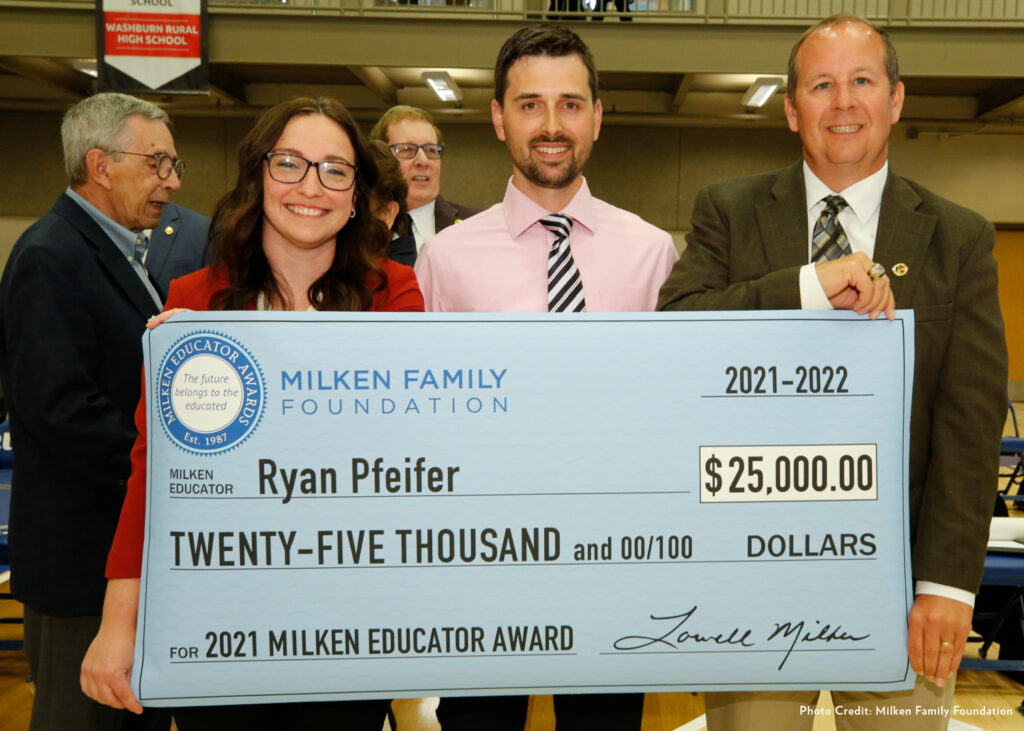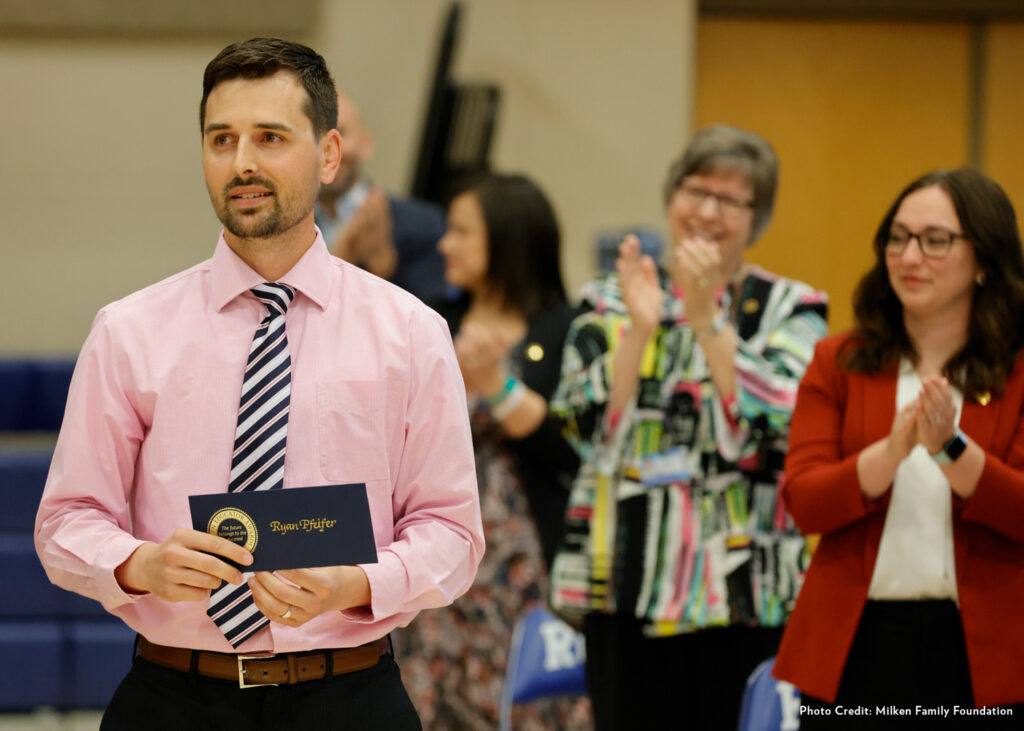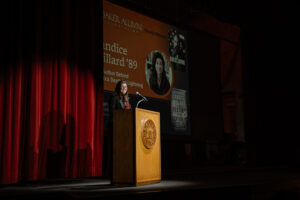Ryan Pfeifer, ’13 MAEd, savors those moments when his students at Washburn Rural High School in Topeka, Kansas, respond to his lessons explaining complex biological processing mechanisms.
“I love teaching the scientific processing skills in order to foster an appreciation for the sciences,” Pfeifer said. “I love building relationships with students and seeing them smile when they are in my class, and I genuinely love pedagogy and planning out and implementing quality lessons.”
In April, Pfeifer was honored for his teaching with the prestigious Milken Educator Award and $25,000 at a surprise schoolwide assembly. The Milken Award program, often referred to as the “Oscars of Teaching,” by some education groups, salutes the early- to mid-career educators with promising futures in education.
“I think the award is as much a challenge to provide future contributions to education as it is recognition for past work. I feel incredibly grateful to have received the award and value the recognition it provided as it validates a lot of personal sacrifice, but it certainly rekindles the fire a bit. I have an even stronger passion for education now and can’t wait to attend the Milken Educators Forum in Los Angeles this summer to collaborate with fantastic educators from all over the country. I am looking forward to continuing my career in education and finding new and innovative ways to reach all of my students.”
Ryan Pfeifer, ’13 MAEd
Pfeifer has taught nine years at Washburn Rural. He currently teaches Honors Biology 1, Honors Biology 2 (a semester of human genetics and a semester of microbiology) and International Biology Higher Level 1 and 2. He has served as the chair of the science department for five years.
As an undergraduate, Pfeifer enrolled in the predental program at Kansas State University because he wanted to help people through a medical field. While taking his early science courses, shadowing professionals, and attending dental organization meetings, he quickly realized he could help people in other ways and changed his major to education. He earned a bachelor’s degree in education with an endorsement in life science from Kansas State in 2011.
“I think that I reflected internally and thought about what it was that would potentially bring me the most satisfaction and personal fulfillment,” he recalled of switching majors his freshman year. “I thought about my past teachers and the influence they had, as well as the feeling I got when on an academic campus. High school and college campuses are incredibly positive places to be because there is so much potential, and the general feeling is always the pursuit of excellence.”
One of those influential teachers was Brad Nicks, who taught Pfeifer at Shawnee Heights High School in Tecumseh, Kansas, before moving to Abilene, Kansas. Nicks, a 2009 Milken Educator Award recipient, attended the schoolwide assembly in April to help celebrate his former pupil.
“Mr. Nicks is everything an exceptional teacher should be,” Pfeifer said of his former teacher of mathematics, physical education, and health. “He is personable, professional, empathetic, understanding, maintains high expectations, is always prepared, and has an extremely good understanding of classroom management. He was and continues to be such an inspiration to me. I knew that I wanted to be an educator like him and be for others who he was for me.”

Another experience that reinforced Pfeifer’s desire to creatively motivate and challenge students to do their best was his Master of Arts in Education program at Baker University.
“I found my experience at Baker very rewarding, professional, and engaging. The staff were personable, professional, understanding, and real. They genuinely wanted the best for all of their students, which further developed my appreciation for all things education,” Pfiefer said.
Pfeifer finds teaching and connecting with students to be motivating.
“I love the challenge of teaching complex biological processing mechanisms to different levels of students,” he said. “I am very comfortable being real and vulnerable with my students. I always expect their best, and they know it. I strike conversations with everyone and try to find ways to connect with all students, regardless of background, personal interests, and extracurricular activities. I hold extremely high expectations for all students and continually push them to meet them and achieve success.”
Flipping the Classroom
Early in his career, Pfeifer “flipped” his science classes by providing lectures online and allowing more class time for engaging in science activities and experiments. The students immediately responded to the change.
“I make and post YouTube video lectures for my students, which serve as my direct instruction,” he said. “These videos are to be completed at home as homework, which frees up all of my in-class time to be used for extension and application of the concepts. I think my expertise is better suited to working with students on tasks designed to meet higher-order thinking, which can successfully be done in class now that the direct instruction piece has been removed. These higher-order thinking tasks have been missing from the classroom when direct instruction is more traditionally included via a lecture format.”
In addition to teaching and serving as department chair, Pfeifer coaches pole vaulters on the Washburn Rural track team.
“I find that my background in life sciences do play a role in my understanding of the mechanics of the event,” he said. “I do utilize many biochemical and biomechanical explanations in my rationale for teaching the technique pieces of the event. I think the students do appreciate learning ‘why’ and ‘how’ the event is supposed to work from a scientific point of view.
Pfeifer sets high standards for his students inside and outside the classroom.
“I think students need to challenge themselves in whatever way they feel appropriate,” Pfeifer said. “I consider students successful if they challenge themselves to be more outgoing. I consider students successful if they challenge themselves to diversify their participation in various clubs and activities. I consider students successful if they challenge themselves to run for a leadership position within the activity they are participating in. I consider students successful if they put forth effort, responsibility, compassion, empathy, professionalism, and think critically in face of adversity.”
Written by Steve Rottinghaus, ’14 MSM





